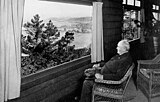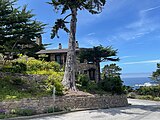
Carmel-by-the-Sea, commonly known simply as Carmel, is a town in Monterey County, California, located on the Central Coast of California. As of the 2020 census, the town had a population of 3,220, down from 3,722 at the 2010 census. Situated on the Monterey Peninsula, Carmel is a tourist destination, known for its natural scenery and artistic history.

Carmel Highlands is an unincorporated community in Monterey County, California, United States. It is 3.5 miles (5.6 km) south of Carmel-by-the-Sea, at an elevation of 318 feet. Carmel Highlands is just south of the Point Lobos State Reserve, and serves as the northern gateway of the Big Sur coastline along California State Route 1. Carmel Highlands was laid out in 1916 by developers Frank Hubbard Powers and James Franklin Devendorf and the Carmel Development Company.

Tor House and Hawk Tower are buildings in Carmel-by-the-Sea, California, United States. They were the home of poet Robinson Jeffers and family from 1919 to 1999. The two structures, often referred to jointly as Tor House, are generally believed to have played a crucial role in the development of Robinson Jeffers as a poet. Stewart Brand, founder of the Whole Earth Catalog, describes Tor House as "a poem-like masterpiece" with "more direct intelligence per square inch than any other house in America".

William Frederic Ritschel, also known as Wilhelm Frederick Ritschel, was a California impressionist painter who was born in Nurenberg, Kingdom of Bavaria.
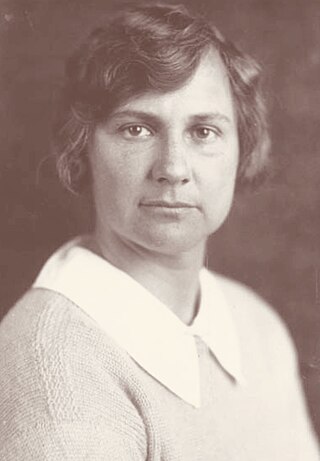
Marion B. Hollins was an American amateur golfer. She is known as an athlete and as a golf course developer, one of the only known female golf course developers in history. She won the 1921 U.S. Women's Amateur and was runner-up in 1913. She also had many other amateur wins. She was the captain of the first U.S. Curtis Cup team in 1932.
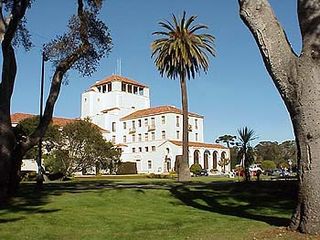
The Hotel Del Monte was a large resort hotel in Monterey, California, from its opening in 1880 until 1942. It was one of the finest luxury hotels in North America. During World War II, it closed and the building was leased to the United States Navy. It first was used by the Navy as a school where enlisted men spent the second, third, and fourth months of an 11-month course being trained as electronic technicians. Later the Hotel Del Monte became the Naval Postgraduate School.
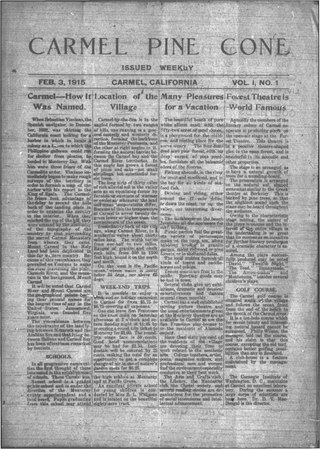
The Carmel Pine Cone is a free weekly Californian newspaper. It serves the city of Carmel-by-the-Sea and the surrounding Monterey Peninsula, Carmel Valley and Big Sur region of Monterey County in central California. The paper is known for red-baiting. It is a newspaper of record for Monterey County.

Mission Ranch is a historic hotel and restaurant in Carmel, Monterey County, California, United States. It is located in the unincorporated Mission Tract south of the incorporated city of Carmel-by-the-Sea, near the Carmel Mission, at 26270 Dolores Street. The property was bought in 1986 by Clint Eastwood, who restored the premises in the style of the original buildings. The hotel has 31 rooms located within ten buildings on the property.

Outlands in the Eighty Acres, also known as Flanders Mansion is an 8,000-square-foot Tudor Revival house. It is significant as a work of architect Henry Higby Gutterson, and for its innovative construction with light grey interlocking Precast concrete blocks. It is one of the earliest architect designed residences in Carmel-by-the-Sea, and the only known example of work by Gutterson in the region. It is located within the Mission Trail Nature Preserve in Carmel-by-the-Sea, California. It was listed on the National Register of Historic Places on March 23, 1989.

James Franklin Devendorf, was a pioneer real estate developer and philanthropist. Devendorf and attorney Frank Hubbard Powers (1864-1921), founded the Carmel Development Company in 1902. He became the "Father" of an artists and writers' colony that became Carmel-by-the-Sea, California, which included the Carmel Highlands, California. Devendorf spent the next 30 years of his life developing Carmel and the Carmel Highlands into a community of painters, writers, and musicians.

Santiago Jacob Duckworth, known locally as S. J. Duckworth, served in the California State Assembly for the 61st district from 1893 to 1895. He was as an early Monterey pioneer businessman, real estate developer, and visionary of the short-lived Carmel City. In 1889, he wanted to build a Catholic summer resort, bought the rights to develop the area, filed a subdivision map, and started selling lots.

Perry Harmon Newberry was an American journalist, writer, actor and producer. After working in Chicago and then in journalism in San Francisco, he moved to Carmel-by-the-Sea, California in 1910. There he became involved as an actor and producer at Forest Theater, and in writing, directing and producing large-scale outdoor historical pageants. In 1922 he became the fifth mayor of Carmel-by-the-Sea, known for his efforts to maintain the rustic atmosphere of Carmel's art colony by resisting infrastructure improvements and to "keep Carmel free from tourists". In 1924 became the editor and co-publisher of the Carmel Pine Cone.

The La Ribera Hotel, also known as the Cypress Inn, is a historic Spanish Eclectic hotel in Carmel-by-the-Sea, California. It was designed by architects Blaine & Olsen of Oakland, California and built in 1929, by Meese & Briggs. The building was designated as a significant commercial building in the city's Downtown Historic District Property Survey, and was recorded with the Department of Parks and Recreation on February 13, 2003.

Edward Gerhard Kuster was a musician and attorney from Los Angeles for twenty-one years before coming to Carmel-by-the-Sea, California, in 1921. He became involved in theater there and established his own theatre and school. He built the Theatre of the Golden Bough in 1924, and a second and third theater, each called Golden Bough Playhouse, the last of which opened in 1952. Kuster directed 85 plays and acted in more than 50 roles in the 35 years he lived in Carmel.
The following is a timeline of the history of Carmel-by-the-Sea, California, United States.

Ira Mallory Remsen , known locally as Rem Remsen, was an American painter, playwright and Bohemian Club member. He was the son of Dr. Ira Remsen chemist and former president of Johns Hopkins University. Remsen was the author of children's plays notably Inchling and Mr. Blunt, he produced at the Forest Theater in Carmel-by-the-Sea, California in the 1920s. His studio on Dolores Street became the permanent home for the Carmel Art Association in 1933.

Laura W. Maxwell, also known as Laura Maxwell, was an American artist. She painted in oil and watercolor; her subjects included landscape, floral, and marine-themes which were exhibited in various art centers. She helped to establish the Carmel Art Association.
Marcel Sedletzky was an American architect who lived in Carmel-by-the-Sea, California.

Jon Konigshofer was a house designer and builder who was never licensed as an architect, but known for his minimalist low cost homes, primarily built in the Monterey Peninsula. He also designed homes and commercial buildings in other areas of California and Mexico.


